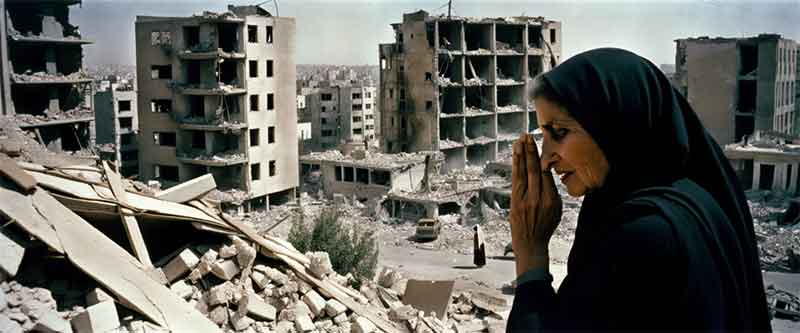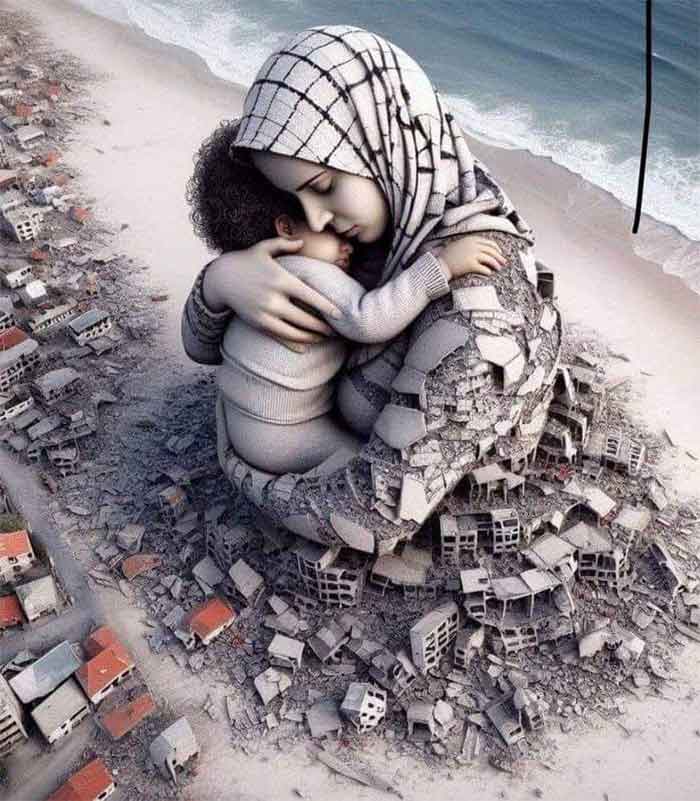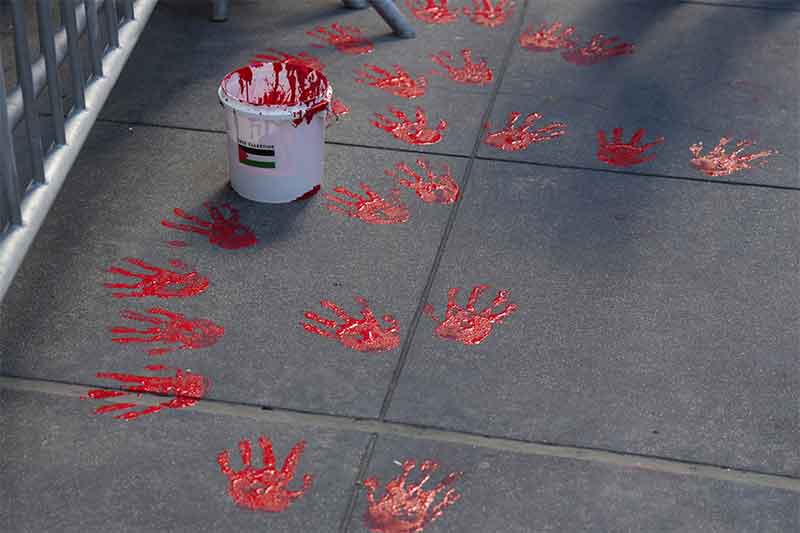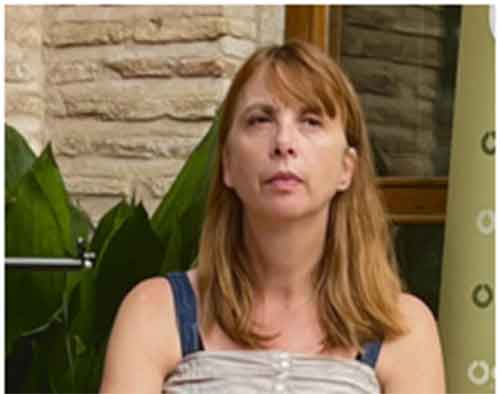
Nathalie Quintane is among the most known experimental poets of France. To quote her from what she writes about herself in the French government’s publications website, this is what she writes-
“My name is still Nathalie Quintane. I have not changed my date of birth. I still live in the same place.
I am few in number but I am determined.”
Nathalie belongs to the generation of post 60s French literary activists.
Rupak: Let me start by asking, what is literature to you and what is poetry? Are they one and the same thing?
Nathalie: (Thinks a bit) No, not the same thing at all, even if people use one word for the other. What really interests me is poetry. Poetry, for me today, and from the beginning has been an exercise! Almost like a training, that helps you to connect yourself to your views on things and your experiences. What I am trying to say is that, without trying to adapt, poetry is like writing things ad hoc that can adapt itself to the present by itself. For me, it stands on a tripod of three things, namely, a register which in the end culminates to pure aesthetics, a device, and a political object with a clear political goal of revolution. You know, it is quite ironic that the first book of Das Capital also meets these three criteria. Recently I reread his first book again and it surprised me.
Rupak: Don’t you think that Marx’s literature themselves have certain amount of poetic essence to them, at least at the literary level?
Nathalie: Well, not to put Marx into poetry (laughs), I do think that there is certain amount of poetry in what Marx is ‘trying to do’.
Now, coming to your question, I know of an Argentinian publication (I forgot the name) which has gone into the Literary aspect of Marx, especially Das Capital. This literary aspect includes the accounts and anecdotes that people have told him, quotes from Economists etc. that all find their way into the document.
Rupak: By saying “not to put Marx into poetry” are you trying to imply that, even having these literary aspects to his work Marx’s writings remain primarily a ‘Literature of Knowledge’?
Nathalie: No, It’s not that deterministic! What I can say is that it goes in the same vein, for example, with Christoph Hanna, about whom you had referred previously. Marx’s work is primarily an investigation which transcends at the end into something very poetic. This poetic process serves the investigation.
We cannot classify Marx’s work as literature or poetic literature because it disengages everything. As long as literature and poetic literature is on the side of aesthetics, we cannot put Marx into that box. Yes, this is a paradox! We need to define Marx as something else.
Rupak: What category would that be?
Nathalie: (Laughs heartily) It’s more of a question of the use we have for the text and the moment that we are in. May be tomorrow I won’t have a need for Das Capital at all, maybe the use won’t be there. It’s the relevance that counts. It has to do with the usability at the time when we need it.
Rupak: I do not get your point here! Are you trying to imply that Marx is always contemporary or that Marx might not be needed at certain point of time?
Nathalie: Well, In France there was a long period when Marx simply disappeared, around the 1980s and later, for at least twenty years! That is why I am reading it you know! (laughs) I am hearing more and more about him and his writings now than when I was younger. It is like we are going back to Marx.
Rupak: Understood!
Now let us come to your work and especially to your poetry. I have noticed an abrupt change in your poetic approach in the last 15 years. What I mean is, your work in the late 90s and early 2000s, for instance Chaussure (Shoe) manifested a completely different genre of poetic aesthetics whereas I notice a sharp turn after the Tarnac Affair event in France, especially starting from Tomates (Tomatoes). I would like to know how Nathalie of 2022 analyses her pre-millennium poetic self?
Nathalie: Right, from Tomates my poetry becomes themed. And this phenomenon was picked up by journalists because it had a strong political vein to it and because most probably more people read it. No, I did not plan on going on to a next step, its just that an external political event had a collision with my life and my way of responding to those events have been through writing.
Having said that, I feel that from my first book Remarques my work has always been expressing concrete experiences. These may include bodily experiences, daily experiences, etc. and you can find leftovers of that in Tomates as well. What has been added from Tomates is a transmission of one’s political experiences, which, for my generation had failed. Even the political group ‘Action Directe’ have recognized this failure of passing on their political engagements and experiences to the younger generation. I would say Tomates is an effort of solving that problem.
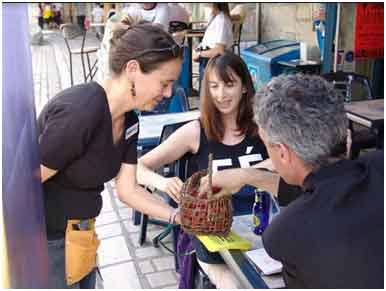
2004; Nathalie Quintane with Claude Yvroud
Rupak: Understood. But there remains a confusion about your poetic lineage in my mind. During the time I translated those few poems from Chaussure I had noticed a strong inclination in the media to connect you to the poetic lineage of Francis Ponge. But I never found you referring to Francis Ponge yourself. This keeps me baffled. I would like to know your point of view on your own poetic lineage.
Nathalie: (Laughs and nods her head in affirmation) In the 90s I gave journalists a name that they knew well, which was Ponge (laughs again)!
A big part of my adolescent reading comprised numerous 19th century and earlier French writers, primarily Gerard de Nerval, Rimbaud and Ducasse (primarily The Count of Lautréamont). Most of their work pertained to autobiographical and critical poetry. Rimbaud’s Une Saison en Enfer (A season in hell) was especially important for me. One can easily trace my connection to such autobiographical, critical, and political aspects of their work in Tomates. So that’s the matrix!
Rupak: So, you do confirm that Ponge was not your principal predecessor?
Nathalie: No, he was not! (Laughs again)
Rupak: Coming to Chaussure, and primarily to the poems that I translated, in an interview documented in 2010, you had said, and I quote, “Chaussure is an animist book. … it is animist book without passion (= without suffering).” What do you mean by the word ‘animist’ here?
Nathalie: I do not know; I have said a lot of things! (Laughs heartily)
Having said that, let me be very clear about the reference to Ponge that I never expressed him to be an inspiration, it was just an observation. This issue goes back to my first radio interview with ‘France Culture’ after publishing Chaussure, where the host, who was also a poet, was trying to induce something almost spiritual into it! I want to be clear that this is not the case.
Coming to Chaussure, that kind of poetic aesthetics goes back to Rimbaud where one is illuminated and wants to embrace and return to the physical state of existence and earthliness.
Rupak: How is this different from the existentialist way of life and thought?
Nathalie: It would be too ambitious to refer to it with the term ‘materialist existence’. I would rather prefer the word ‘realism’. In Chaussure I expressed an experience that I am a guinea pig of, I was doing the test on myself, so I was the object of experimentation there.
Rupak: Yes, I understood that. But there is another aspect of the creative process in Chaussure that sparked a query in my mind. We, almost always, hear that poetry comes to a poet. That, it is that momentous transition to creative insanity and back which creates a moment of poetry. Whereas, in Chaussure, I could feel that you were working on the experiences and taking time to express them. Was it a different form of practise? In this case, may I say, did you take yourself to poetry?
Nathalie: (Thinks a bit) This is a difficult question! For me poetry is a practise, it is not like ‘poetry just exists’! (smiles) It can’t come to me, or I can’t go to it! Its not even spontaneous, rather it is like luck!
Rupak: Is it revelation?
Nathalie: No, it is like the radio! Once you turn it on, it is just there. But yes, it is coming from somewhere for sure. You can use it; you can practise it…
Abby: Sorry for breaking the intellectual aura of this discourse, but I did have a pair of questions for Nathalie, coming solely from a fangirl of her podcast (laughs)!
Rupak: Please go ahead.
Abby: Referring to Chaussure, may I know what is your favourite pair of shoes? (Laughs again)
And secondly, after returning from Portugal, were your able to continue your practise of the Portuguese language?
Nathalie: (Nathalie gets up from the chair, turns and walks toward the back wall, picks up a pair of black boots, and displays them on the computer camera. We all laugh heartily for a moment! She puts them back in their place, returns and starts speaking again.)
Not really, I haven’t been able to continue it after returning from the sabbatical. I loved the work of Adelia Lopes, sheer genius! She is one of my favourites.
Rupak: Yes, I had the chance of reading a couple of poems from a crude English translation of her publication ‘Elisabeth Doesn’t Work Here Anymore’. She is stupendous! And of course, it goes without saying that your poetic aesthetics does intertwine with that of her at certain levels.
Thanks Abby, that was a needed break!
Coming back to your perception of the existence or perennial evidence of poetry, what is then the contribution of the readers in your creativity?
Nathalie: They are a part of my experiences. It is not me saying this for the first time, but poetry is addressed to someone, and quite often that space is very precise. There are not a lot of people reading it anyhow. Ginsberg, being the premiere leader of the Beat Generation knew very well to whom he was addressing his work to. It is obvious that more people were listening to him, but he precisely knew whom he was talking to.
Rupak: Well, when you refer to Ginsberg, I cannot help but bring into context the work of our Hungrialist poets and writers! This is why I was referring the names like Malay Roy Chowdhury, Shakti Chattopadhyay, Debi Roy, etc. the other day.
Nathalie: Off course! Off course! I think Ginsberg might have stolen a lot of things from the Hungrialists! (laughs)
You know I tried to go through the names of the contemporary poets of this current generation that you had shared with me as well. Very few have been translated to English. You should make sure that they are available to the world. It is very important.
Rupak: Coming back to my previous question, how do you evaluate your own evolution as a poet and a literary activist over all these years? I want to go to your creative form through this question.
Nathalie: I have been doing this from the age of fifteen. Art has been a part of my life and putting it into an avant-gardist perspective, Art is Life. Even when I am doing dishes it is just there, art and poetry are always there!
Rupak: Let us talk a bit about your contemporary work. What and how according to you has your work evolved through the last 10 years? I mean, let us say, after Tomates (or the Tarnac event) and through the periods of immigrant crises in France and at finally the very contemporary state when you talk about the so-called neo-communism which is yet not defined or yet to arrive?
Nathalie: I think it is quite evident that I have tried to take poetry out of the poetic form in general, isn’t it? As lyrical verses are generally identifiable to the poetic form, I wanted to move away from that; to put a little bit of ‘me’ or the ‘I’ into it to make it more intimate. In Chaussure the ‘I’ or the ‘me’ was an exterior entity; now you can say that I want poetry to be detonated like a bomb! Of course, symbolically! You might relate this to Mallarme’s inclination to poetic anarchism.
Rupak: Yes, but that was 1894! Now I would probably relate it more to Monique (Wittig) stating, and I quote, “Any important literary work is like the Trojan Horse at the time it is produced. Any work with a new form operates as a war machine, … It is always produced in hostile territory. …, it will eventually work like a mine. It will sap and blast out the ground where it was planted”. Won’t you?
Nathalie: Yes! But it is not a noise to be heard or seen, I want poetry to be ‘not-for-big-kids’! Excuse me for putting it this way! For example, you can take the case of ‘Les enfants vont bien’ (The children are doing fine) where I wanted the violence forced on the immigrants to be ‘seen’ and not ‘read’! Hence the form!
Rupak: And that is why you used the picturesque form and collaged cut-outs of actual administrative writeups from the establishment along with documents from the vegetized middleclass and the working NGOs who were the minority?
Nathalie: Yes, I wanted to show something that was actually as violent as was being done to them. I did not want to express it through any of the conventional narrative forms with characters and stories. I abruptly cut the actual governmental administrative texts, and that cut manifested the actual violence evident in the entire political experience of that time; off course without trying to moralize people. Just to literally make the point!
Rupak: And you expect this deformation to create a stir in the normal state of the middle-class mind?
Nathalie: Well, the first thing that I am doing is working on my own mind and psyche, I am as normal as any human being living in my little town!
Rupak: Yes, I mean in that case you are deforming the state of so-called defined ‘normality’ in yourself first, isn’t it?
Nathalie: Exactly! I was using my poetic devices to break the establishment-induced discourse about the immigrants which was evidently pre-set in all our conscious minds!
Rupak: So, where does this put you or your stance in the contemporary political landscape of France?
Nathalie: I am not a card holding member of any party!
Rupak: I know that! What I mean is in the cultural perspective?
Nathalie: Let me tell you that a few years ago ‘Le Front de gauche (The Left Front)’ approached me offering to speak and discuss possibilities. I clearly said no, because I write, and I do not know what I am going to write next time! I do not have a program, or a platform! Saying yes would mean committing myself to an agenda!
Rupak: Are you saying that contradiction is an inherent component of modern creative activism?
Nathalie: Yes; because I do not know what I am going to think tomorrow. Take the case of Ukraine and what is going on in that country. Can you guarantee that whatever the world thinks today about it will sustain tomorrow? But to be clear, I am not implying that this contradiction is making the situation or experiences relative. It is not relativism.
So, now you can probably get a feeling of ‘what or where I am not’ rather than ‘what or where I am’! Because that is exactly where I am not! (smiles)
Rupak: Yes, I have read ‘Tomates’ and ‘Why doesn’t the far left read literature?’ both in English, and I have seen ‘Les enfants vont bien’.

Nathalie: Thank you!
Rupak: And where does all these fit into your idea of neo-communism? I can see a clear reference to Zizek in what you say, in context to it.
Nathalie: I can’t say that I have read him very recently. But for France it means Marx is back! (laughs) There used to be a publishing house called ‘Commune’ in the United States named after the French Commune. I think it has gone out of business now (smiles).
On a serious note, there is a literary use of the term ‘commune-ism’ in France, and starting from the 1960s we can find it’s traces throughout our country’s literature here and there. Take the example of, let’s say the ‘Community of Lovers’ (1970s). There is a very famous poet named Bernard Noel in France and he is an expert on the literature of commune. He has also written a big dictionary on the subject.
Rupak: Are you referring to the same Noel who received the Grand Prize for Poetry from the French Academy in 2016?
Nathalie: Exactly!
Coming back to your question on Neo-Communism, the idea goes beyond of what we have known from and about, let’s say the Soviet Union, or Cuba and others. It has got a literary essence to it. We have appropriated it; we have made it our own!
Rupak: Are you saying that you have departed from your own poetic aesthetics to a new form of poetic communism?
Nathalie: No, what you say is too big! What I mean is, for example the case of ZAD de Notre-Dame-des-Landes. A group of people coming together and starting to live as a commune, which starts based on a specific political experience!
Rupak: Can you explain the situation a bit in detail for us and our readers?
Nathalie: Yes, of course! It is a big zone located in the North of France. ZAD means Zone-a-Defendre or the Zone to Defend. The people living there now had accumulated initially to protest an airport development project which could potentially destroy the natural wetlands of the zone. After the project got scrapped and the development ceded, people converted it to an area for experimenting with life through a non-capitalist form of society and other social structures. It is a modern-day commune. It started in 2013.
Rupak: Astonishing!
I have primarily two final questions. First one relates to my work on translating the contemporary female poets of France. As you know four poems from your Chaussure were the first ones that I translated with the help of my collaborator Nina.
Nathalie: Yes, I remember. (smiles)
Rupak: What I have seen through the process is your partial departure from the feminist lineage, let’s say your book “Jeanne D’arc” to, as you say a form of Marxist poetic activism. Does that imply that you are seeing a merger or convergence of the contemporary feminist or gender movement into a more general form of communism?
Nathalie: Well, my initial reference to Marx was a bit of a provocation for you! (laughs)
On a serious note, there are two sides to my answer to your question. I am not denying the fact that what I do has a bit of its essence rooted in that process. Having said that, I do not think, with the meagre number of my books being sold, my work does have that much of an impact. I am after all a marginal poet. For me, yes it has been a typical path. Whenever I am approached by anyone from the LGBTQIA+ community they generally refer to my book ‘Crâne chaud (Hot Head)’. It’s a book that pertains to realism, surrealism, and fantasy-oriented approach to sex at the same time.
Abby: I had a small question about your feeling on the state of contemporary education in France. I am a teacher myself and you are too. We all know that there is this issue of teacher shortage, the ongoing COVID situation and many other issues like these. What are your thoughts about the current climate?
Nathalie: I am lucky to be in a situation, which I think should be a situation for everyone, where I work part time in a junior high school. That is why I don’t have to deal with all the bureaucratic reforms going on in the system. The system is basically turning an entire generation of kids away from literature.
(Nathalie’s cat climbs on the table. She refers to her and introduces her to us. We have a light moment of laugh!)
Rupak: Don’t you think, this overall departure from literature is a universal phenomenon?
Nathalie: Yes! Teaching here has become privatized. And people with some amounts of money are sending their kids to private schools. It is destroying the literary lineage of public schools here.
Rupak: Is this more of a contemporary problem? Because our generation have been a witness to similar phenomena in Bengal (India) as well, at least in the developed areas.
Nathalie: For us this has been an ongoing issue from the 80s. And now, the kids going to literary studies finally end up in completely different tracks of humanities like sociology etc. They are not sticking to literature anymore and whoever stays back are doing it merely by default! I will end this by saying that Christophe Hanna, to whom you have referred in our previous email conversations, who you know is a pioneer in his own form and genre, should be teaching University level literature. But the establishment and its bureaucracy has forced him to remain at the high school level.
Another problem is literary exchange. All that gets translated is American poetry. It is very difficult to get any sort of translatory collaboration between other languages and us! For Instance, the Spanish language is so like French, still it is almost impossible to have any sort of exchange. It is American poetry that dominates this area, and that too not because it is good! It is unfortunate that young people who are good in English simply choose to do this!
Rupak: Thanks a lot for your candid answers and this in-depth discourse Nathalie. I hope we will be able to have more sessions like this in future as well.
Nathalie: Yes Rupak, let us stay in touch.
[*Abby Heraud acted as a bilingual interpreter in the interview.]
Rupak Bardhan Roy works as a senior scientist for GE Healthcare, France. On the vocational side he has been working as a literary/cultural commentator and writes on cinema, social issues, travel etc. and is an active advocate of ‘Scientific Temper’.


